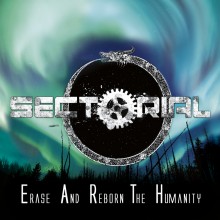Reviews
HEAVY METAL TRIBUNE, Singapore
Just as I thought that there can be no more new innovations to the already saturated metal genre, I chanced upon Ukraine’s Sectorial. The fact that the band describes their music as a hybrid of thrash metal and grindcore got me somewhat interested, with most grind bands having a heavier death metal influence instead, though that’s not to say that thrash influences aren’t present. But that’s not the most interesting part of Sectorial‘s music, as one would soon find out on their debut full length release, Erase and Reborn the Humanity.
The introductory segment of He Who Eats the Tale presents some rather unconventional sound effects that one would easily attribute as electronic elements, but as the album begins one would realise how wrong he is. The music on Erase and Reborn the Humanity would be more than simply thrash metal and grindcore, but one would soon notice elements of black metal and folk metal in the band’s material as well. Sure, the main style of the band here is classic ballsy grindcore that will remind listeners of bands like Phobia and Wormrot, with the crushing riffs and the urgent pace of the music, and the short track lengths that would please those with ADD, especially with tracks like Stones Have a Vote. But the madness begins with Too Much?, with the native instrumentations that are present giving a unique touch and a contrasting sense of calm to the chaos that the rest of the band are indulging in. Furthermore, the instrumental interlude Before the Silence Came even includes sounds of nature, along with some wind instrumentation, providing some atmospheric aspect to the music and fitting to the themes of nature and social issues of Sectorial‘s lyrics, and provides a much needed calm in the midst of a raging storm.
The band could have been easily dismissed as one that simply makes use of gimmick to gain attention, but at the same time it is rather hard to overlook the talent that each of the band members have. Sure, the folk and native instrumentations that are present on the record could be the thing that allows for Sectorial to stand out from its other grindcore peers, but at the same time, the rest of the band display their abilities on their instruments, in particular the drums of Igor, who blasts relentlessly throughout the album. Guitarist Dmitriy also at times contribute to the soaring guitar solos that are on the album, providing the songs with a sense of melody, and as if those riffs that he unleash aren’t punishing enough, Boris’ bass guitars are also rather clear in the mix, providing that heavy, rumbling tone and also some groove to the music.
On Erase and Reborn the Humanity, the music of Sectorial sounds like what grindcore veterans are capable of putting out, displaying the talent that these Ukrainians have. The folk influences that the band has included has made this release all the more interesting, and Sectorial is certainly on to something good here. If Sectorial manages to continue in this excellent direction, who knows, they could one day become masters of a genre that they could call their own.
